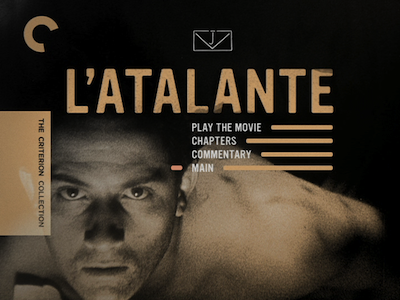
There is a scene in the last act of Jean Vigo's 1934 film L'Atalante where the old sailor Père Jules, played by legendary French actor Michel Simon, imagines he is playing a record by moving his fingers along the groove. Vigo lays in accordion music to match his movements, stopping and starting as he does, before pulling back to reveal that Jules has been tricked by his young bunkmate (Louis Lefebvre). The boy has been playing the accordion just out of frame. Angered by the prank, Jules admonishes the kid, telling him that he might laugh at such a flight of fancy, but is playing a record with your finger all that impossible? They don't understand how electricity works, or how music is sent across radio waves, so how can they rule anything out?

L'Atalante has a similar allure. It may not be obvious why this unassuming little film works so well, but it somehow enchants all the same. Perhaps it's Vigo's creation of this dual universe, of a world where dreams can sit side by side with hard reality, that is the secret to its success. We want to be enthralled under its spell, because maybe then we can believe that our own reality is worth it.
The story opens in a small town in rural France. A wedding ceremony has just concluded, joining local girl Juliette (the luminous Dita Parlo) with a boat captain named Jean (Jean Dasté). Jean is the skipper on a three-man barge that sails the French canals, delivering goods from port to port. Juliette has never left her birthplace prior to this honeymoon, and yet her married life is immediately on the move. More than that, the barge will be her conjugal home, always in motion, the background forever changing. It's going to be quite an adjustment for her. Indeed, it's going to be an adjustment for the whole crew. Yet, Juliette has always known that the water holds her fate: she believes if you stick your head below the surface, you will see the image of your true beloved. It's how she knew who Jean was before she even met him.
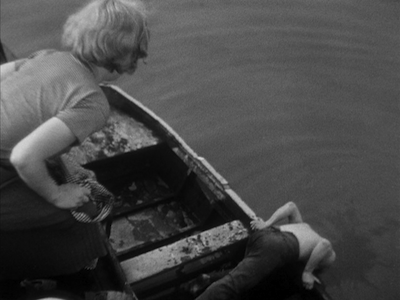
So, Juliette dreams of love, and she also dreams of seeing Paris. Eventually, the boat--which, like the movie, is named L'Atalante--will get her there. Strife amongst the workforce prevents her from enjoying it when they do, just one of the many disappointments the new bride will suffer. At the same time, she makes peace with Père Jules, who invites her into his cabin. There, the salty dog shows her the bizarre treasures he's gathered from around the world. Having never seen such wonders, Juliette is mesmerized. Some of the objects are simple, like a Chinese fan, others are more unique, like the jar holding the hands of Jules' best friend, now deceased. We will see this joy at such unexplainable sights two more times before L'Atalante is through: next at the port where Juliette meets a salesman (Gilles Margaritis) that is an expert at sleight-of-hand, and then the last time when Juliette finally sneaks off to Paris.
Each time, this happiness will be balanced by darkness. When Jean finds Juliette in the cabin of his second-in-command, he loses his temper. Enflamed by jealousy, he reveals a previously unseen violent streak. It shows up again when they meet the salesman, and also when he discovers Juliette has disappeared. Only that final time, he abandons Juliette to the city...and himself to despair.
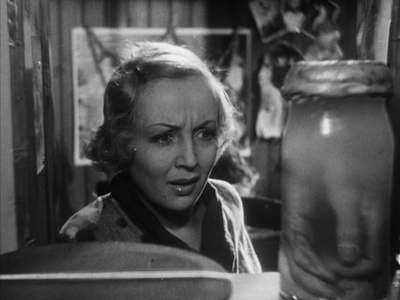
L'Atalante is a deceptively simple romance. The basic story may lack complication, but the presentation has many layers and a balanced sense of its internal world. There are dualities throughout, be it above deck and below deck, sea and land, town and city. Both Jules and Jean have double natures, and both are capable of tenderness and violence alike--though, despite his warnings that he might strike, Jules never does, whereas Jean hides his anger until it's too late. This makes sense, though, when you notice that Jules has an ability to appreciate life's magic that Jean does not possess. Jules has been to all corners of the globe and seen many things, whereas it's possible Jean has only sailed up and down the same canals. When Juliette compels him to look into the water to test his love, he sees nothing, and his pretense otherwise doesn't fool her.
It's a very romantic trope, actually. Jean has to learn to see the world in the same way as his wife if he ever hopes to keep her. Juliette is too innocent for the common world, and she could be tempted away if not careful. To protect her properly, he has to be able to match the purity of her feeling toward him. It's the only way he will ever be worthy.
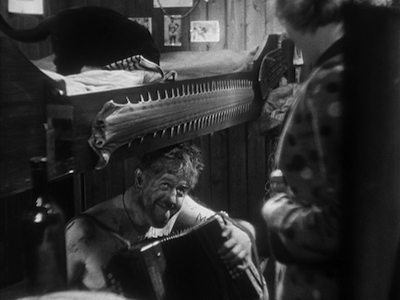
In his earlier short films [reviewed here], Jean Vigo experimented with camera effects and used a lot of tricks to create a feeling of wonder that he manages effortlessly without them in L'Atalante, his only full-length feature. The only visual technique he revisits is the underwater photography he showed in 1931's Taris, his portrait of a champion swimmer. His camera will have to go below surface once again to capture Jean's transformative moment, as the skipper literally must go deep in order to rise again as a new man.
There are few other effects in L'Atalante; at the same time, Vigo creates a dynamic spatial relationship between his actors and his camera. In one memorable shot, Jean crawls across the deck of the barge, just like one of Père Jules' many cats, creeping up to the camera lens and then climbing over. There are many shots like this, where the director is so deep in the thick of things, it's almost as if the characters know he is there. The salesman, for instance, practically performs directly to the screen. This allows for intimate observances, be it Juliette's private fantasies while window shopping in Paris or our glimpse into their separate bedchambers when the newlyweds have rapturous dreams about one another, the fires of loneliness and desire stoked by their time apart.
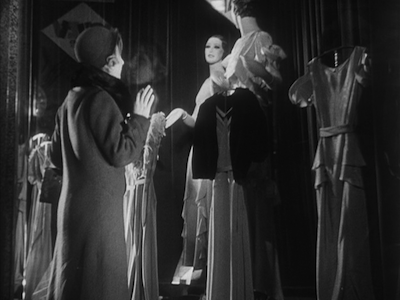
It's finding these lyrical moments within the dirty confines of the everyday that sets Jean Vigo's work apart from his contemporaries, inspiring many filmmakers who came after. It's also a defining element in Simon's performance style, his combination of a very complete physical presence with a clownish demeanor. He's just as amazing in L'Atalante as he was in Jean Renoir's Boudou Saved From Drowning only a couple of years earlier, or as he would remain in The Two of Us [review] decades later. Jean Vigo, on the other hand, never made another film after L'Atalante. He died of sepsis just after L'Atalante was completed. Given the assured aesthetics of this debut, we can only speculate where he might have gone from here. Maybe even greater things, maybe he would have peaked just as he began. We can never know, we are only left with this one perfect vision, a dream that holds strong even in the here and now of the 21st Century.
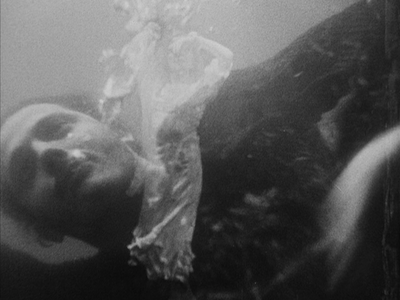
This disc was provided by the Criterion Collection for purposes of review.

No comments:
Post a Comment